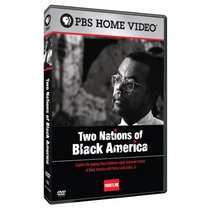| Director: Henry Louis Gates;Jr. Genres: Special Interests, Television, Documentary, African American Cinema Sub-Genres: Special Interests, Television, Documentary, African American Cinema Studio: Pbs (Direct) Format: DVD - Color DVD Release Date: 05/06/2008 Original Release Date: 01/01/2008 Theatrical Release Date: 01/01/2008 Release Year: 2008 Run Time: 1hr 0min Screens: Color Number of Discs: 1 SwapaDVD Credits: 1 Total Copies: 0 Members Wishing: 2 MPAA Rating: NR (Not Rated) Languages: English |
Search - Frontline: Two Nations of Black America on DVD
  | Frontline Two Nations of Black America Director: Henry Louis Gates;Jr. Genres: Special Interests, Television, Documentary, African American Cinema NR 2008 1hr 0min Henry Louis Gates, Jr. explores the gap between the upper and lower classes of black America and probes why it has happened. Reviewing the thirty years that have passed since the death of Martin Luther King, Jr., Gates sho... more » |
Larger Image |
Movie DetailsSimilar Movies
|
Movie ReviewsMuch Left off the Table Jeffery Mingo | Homewood, IL USA | 06/08/2008 (4 out of 5 stars) "This was good in terms of trying to bring up a lot of material in a short matter of time. They brought up DuBois' coining and abandoning of the "Talented Tenth" concept. It spoke of how Dr. King was assassinated right before he was trying to head a march that addressed poverty.
In style and format, this work is very similar to Skip Gates' "Color Line" documentary. Just like with that work, I felt that this work was a bit "dumbed down." Gates' "Signifying Monkey" is no easy afternoon read. Here he asks questions of which I know he knows the answers. Yes, it is great that Gates can speak to elite and quotidian audiences, but still there's a way in which these works are "beneath" him. If Mariah Carey sung a nursery rhyme, I would not be impressed the way I am when she belts out those high notes in her radio hits. That same feeling applies to Dr. Gates. Still, class divisions are not necessarily new in Black American communities. Even pre-Civil Right Era, there were parties to which only the richest were invited. There were monied Blacks who looked down upon poor Blacks. The difference between then and now is that Blacks of all classes were not allowed to live in white areas or attend white educational institutions. I really wish the work touched on how classism and colorism intersect. That goes back all the way to who slaved in the house and who slaved in the fields. There is still a perception that rich Blacks will be light-skinned and poor Blacks will be dark-skinned. Unfortunately, that never comes up here. Too, there were issues brought up outside of the discussion. One sees Dr. Angela Davis critiquing the Million Man March. What did that have to do with class divisions?! Gender divisions, yes, but class divisions, no! (I attended and I thought Black men across class designations were present.) Later, Dr. Gates says, "Harvard Yard feels more like home than Africa does." And what does that have to do with class!? Also, please note that while Black women are present, this work is heavily skewed male and some viewers may find that highly problematic. Countless interviewees here say, "Class is just as important as race." I would never contest that. However, that contention has been misused by the Far Right and that piracy is never brought up here. Dr. Gates interviews Dr. W.J. Williams who first studied class' equivalence to race. Unfortunately, the work never speaks of how conservatives used Dr. Williams' book to say, "Okay, see, this is why one should never bring up racism again!" There are plenty of people who never once contributed money to educate working-class students, but those same people will be the first in line to shout, "Race-based affirmative action should be dismantled and only class-based affirmative action should be allowed!" Many Black youth in the suburbs embrace fashion and films associated with the ghetto. Dr. Gates's new colleague Lani Guinier stated that working-class and middle-class Blacks tend to vote for the same politicians, so when Supreme Court Justices opine "Why can't electoral districts be carved by class, rather than race?" they are wrongfully ignoring a category that still has salience. The avoidance of how class-based activism can be highjacked is highly problematic to me." |



